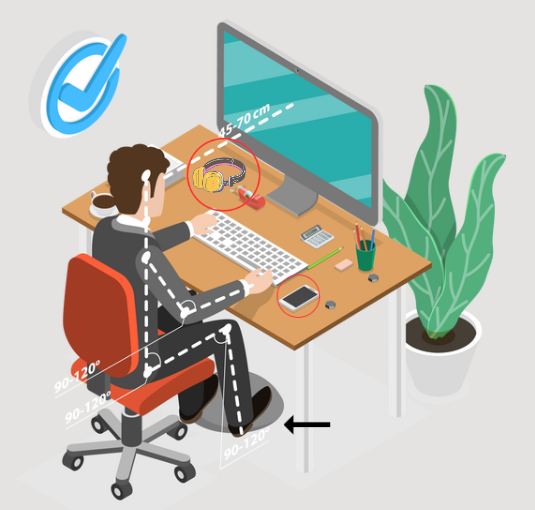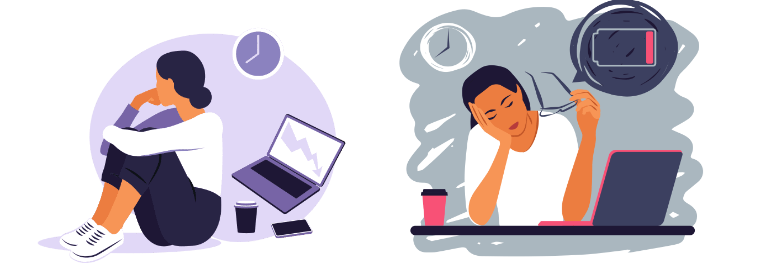As a software developer, your health and well-being are crucial for maintaining productivity, creativity, and overall job satisfaction. The sedentary nature of programming, long hours in front of screens, tight deadlines, and constant mental strain can take a toll on your physical and mental health if not properly addressed.
In this fast-paced and demanding industry, it’s essential to prioritize self-care and adopt healthy habits to sustain your performance and prevent burnout. Here are some key areas to focus on for optimal software developer health.
Workspace Setup: As a software developer, you likely spend countless hours sitting in front of a computer, typing away and staring at screens. By optimizing your workspace setup, you can reduce the risk of musculoskeletal disorders, minimize discomfort, and boost your overall productivity.
Here are some essential tips for Workspace Setup as a software developer

1. Desk and Chair Adjustments
- Invest in an ergonomic chair that provides proper lumbar support and adjustable features such as seat height, backrest tilt, and armrests. This can help maintain a neutral spinal position and reduce strain on your back, neck, and shoulders.
- Position your chair at a height that allows your feet to rest flat on the floor or a footrest, with your knees at approximately a 90-degree angle.
- Adjust your desk height to ensure your forearms are parallel to the floor when typing, preventing excessive wrist flexion or extension.
2. Monitor Positioning
- Place your monitor at an arm’s length distance from your eyes, and position the top of the screen at or slightly below eye level. This can help reduce neck strain and eye fatigue.
- If using multiple monitors, arrange them side by side and at the same height to minimize excessive head and neck movements.
- Consider investing in a monitor arm or stand that allows easy adjustment of the screen’s height, tilt, and swivel.
3. Keyboard and Mouse Placement
- Position your keyboard directly in front of you, keeping your wrists straight and minimizing excessive bending or twisting.
- Use a wrist rest or gel pad to support your wrists and reduce pressure on the carpal tunnel area.
- Place your mouse close to the keyboard and use a mousepad with wrist support to maintain a neutral wrist position.
4. Peripheral Ergonomics
- Use a headset or hands-free device for prolonged phone calls to avoid neck strain.
- Position frequently used items, such as documents or reference materials, within easy reach to minimize excessive reaching or twisting.
- Incorporate ergonomic accessories like footrests, document holders, or laptop stands to promote proper posture and reduce strain.
Eye strain and vision care: As a software developer, your eyes endure a significant amount of strain from prolonged exposure to digital screens. Staring at code, documentation, and displays for extended periods can lead to various eye-related issues, including eye strain, dry eyes, blurred vision, and even long-term vision problems if left unchecked.

- Blink Regularly
- When you’re focused on a screen, you tend to blink less frequently, which can lead to dry eyes.
- Make a conscious effort to blink more often to keep your eyes lubricated and comfortable. Consider using artificial tears or eye drops to alleviate dryness if needed.
- Adjust Your Display Settings
- Optimize your display settings to reduce eye strain. Adjust the brightness, contrast, and text size to comfortable levels.
- Avoid excessive brightness, which can cause glare and further strain your eyes. Additionally, consider using a blue light filter or enabling the night mode on your devices to reduce the amount of blue light emitted, which can contribute to eye fatigue.
- Proper Lighting and Positioning
- Ensure your workspace has adequate lighting to reduce the strain on your eyes. Position your monitor perpendicular to windows or light sources to minimize glare and reflections. Adjust the tilt and angle of your screen to find the most comfortable viewing position, and maintain an arm’s length distance between your eyes and the display.
- Consider Computer Glasses
-
If you experience persistent eye strain or discomfort, consider investing in computer glasses or blue light-blocking lenses. These specialized lenses are designed to reduce glare, filter out harmful blue light, and minimize the strain caused by prolonged screen use.
-
- Regular Eye Exams
-
Schedule regular comprehensive eye exams with an optometrist or ophthalmologist. They can detect and address any vision issues early on and provide recommendations for maintaining optimal eye health, such as prescribing computer glasses or suggesting ergonomic adjustments.
-
Mental Health and Stress Management: your mental health is crucial for maintaining productivity, creativity, and overall job satisfaction.

- Mindfulness and Meditation Practices
- Incorporate mindfulness techniques, such as deep breathing exercises, meditation, or yoga, into your daily routine. These practices can help you stay present, reduce stress and anxiety, and improve focus and concentration.
- Apps like Calm, Headspace, or Insight Timer offer guided meditations and mindfulness exercises tailored for busy professionals.
- Time Management and Boundary Setting
- Develop effective time management strategies to prioritize tasks and manage workloads more efficiently.
- Establish clear boundaries between work and personal life, and make time for activities that bring you joy and relaxation outside of work.
- Cultivate a Support System
- Build a supportive network of colleagues, friends, and family members with whom you can share your challenges, successes, and emotions.
- Consider joining a support group or seeking professional help if you’re struggling with mental health issues such as depression, anxiety, or burnout.
- Regular Exercise and Physical Activity
- Engage in regular physical activity, such as going for walks, running, cycling, or joining a gym. Exercise can help reduce stress, boost mood, and improve overall mental well-being.
- Incorporate simple desk exercises or stretches into your daily routine to counteract the sedentary nature of programming work.
- Prioritize Self-Care
- Engage in activities that bring you joy, relaxation, and a sense of accomplishment outside of work, such as hobbies, creative pursuits, or learning new skills.
- Make time for social connections and nurture relationships with loved ones, as strong social support can positively impact mental health.
- Continuous Learning and Growth
- Embrace a growth mindset by seeking out opportunities for professional development and continuous learning.
- Stay up-to-date with industry trends, emerging technologies, and best practices to maintain a sense of competence and confidence in your skills.
Nutrition and Hydration: As a software developer, your mental acuity and cognitive function are essential for tackling complex coding challenges and problem-solving tasks. Maintaining a balanced diet and staying hydrated are crucial for sustaining energy levels, concentration, and overall well-being

- Balanced Diet and Meal Planning
- Aim for a diet rich in whole, nutrient-dense foods, including fruits, vegetables, lean proteins, whole grains, and healthy fats.
- Include brain-boosting foods like fatty fish (salmon, tuna), nuts, seeds, avocados, and berries, which are rich in omega-3 fatty acids, antioxidants, and other beneficial nutrients for cognitive function.
- Snacking Mindfully
- Keep healthy snacks readily available at your desk, such as fresh fruits, nuts, vegetables with hummus, or Greek yogurt.
- Avoid mindless snacking on processed, sugary, or salty foods, which can lead to energy crashes, mood swings, and weight gain.
- Practice portion control and savor your snacks, taking the time to appreciate the flavors and textures.
- Staying Hydrated
- Keep a water bottle at your desk and set reminders to drink water regularly throughout the day.
- Aim to consume at least 8 cups (64 ounces) of water daily, and more if you exercise or live in a hot climate.
- Caffeine and Energy Drinks
- While moderate caffeine consumption can provide a temporary energy boost, excessive intake can lead to jitters, anxiety, and disrupted sleep patterns.
- If you need an energy boost, opt for healthier alternatives like green tea, which provides a moderate amount of caffeine along with beneficial antioxidants.
- Staying Mindful During Meals
- Practice mindful eating by savoring each bite, chewing thoroughly, and paying attention to hunger and fullness cues.
- Avoid eating while coding or multitasking, as this can lead to mindless overeating and poor digestion.
- Supplements and Consultations
- Consider consulting with a registered dietitian or healthcare professional to assess your specific nutritional needs and identify any deficiencies that may require supplementation.
- If considering dietary supplements, research reputable brands and follow recommended dosages to avoid potential adverse effects.
Physical activity and exercise: The life of a software developer often involves prolonged periods of sitting, staring at screens, and minimal physical movement. Incorporating regular physical activity and exercise into your routine is crucial for counteracting these negative effects and maintaining overall well-being.

- Importance of Regular Movement
- Engaging in physical activity helps improve blood circulation, boost energy levels, and enhance cognitive function, all of which are essential for optimal productivity as a software developer.
- Regular exercise can also reduce stress and anxiety levels, improve mood, and promote better sleep, allowing you to approach your work with a refreshed and focused mindset.
- Desk Exercises and Stretches
- Incorporate simple desk exercises and stretches into your workday to combat the effects of prolonged sitting.
- Perform seated leg raises, desk push-ups, or seated twists to engage your muscles and improve circulation.
- Take regular breaks to stand up and stretch, focusing on areas prone to tightness, such as the neck, shoulders, and back.
- Walking and Standing Breaks
- Set reminders to take short walking breaks every hour or so, even if it’s just a quick stroll around the office or your home workspace.
- Consider investing in a standing desk or adjustable desk converter to alternate between sitting and standing throughout the day.
- Suggest walking meetings or standing team huddles to increase movement and collaboration with colleagues.
- Yoga and Mindfulness Practices
- Incorporate yoga or other mindfulness-based practices into your routine to improve flexibility, balance, and overall mind-body connection.
- Practices like yoga, Pilates, or tai chi can also help reduce stress and promote relaxation, which is essential for maintaining mental well-being.
Sleep hygiene and fatigue management: As a software developer, you often find yourself immersed in complex coding challenges, problem-solving tasks, and tight deadlines. However, neglecting proper sleep and rest can significantly impact your cognitive function, productivity, and overall well-being. Prioritizing sleep hygiene and effective fatigue management strategies is crucial for maintaining peak mental and physical performance.

- Importance of Adequate Sleep
- Sleep plays a vital role in cognitive functions such as memory, attention, and decision-making, all of which are essential for software development.
- Lack of sleep can lead to fatigue, irritability, impaired judgment, and decreased productivity, ultimately affecting the quality of your work.
- Aim for 7-9 hours of quality sleep per night, as recommended by sleep experts, to allow your body and mind to fully recharge.
- Establishing a Sleep Routine
- Develop a consistent sleep schedule by going to bed and waking up at the same time each day, even on weekends.
- Avoid screen time (phones, laptops, TV) for at least an hour before bedtime, as the blue light emitted can disrupt your body’s natural sleep-wake cycle.
- Stress Management and Relaxation Techniques
- Implement stress-reducing practices like deep breathing exercises, mindfulness meditation, or progressive muscle relaxation to calm your mind before bedtime.
- Avoid working or engaging in mentally stimulating activities too close to your bedtime, as this can make it harder to wind down.
- Caffeine and Alcohol Awareness
- Limit your caffeine intake, especially in the afternoon and evening, as it can interfere with your ability to fall and stay asleep.
- While alcohol may initially help you fall asleep, it can disrupt your sleep quality and lead to frequent awakenings during the night.
